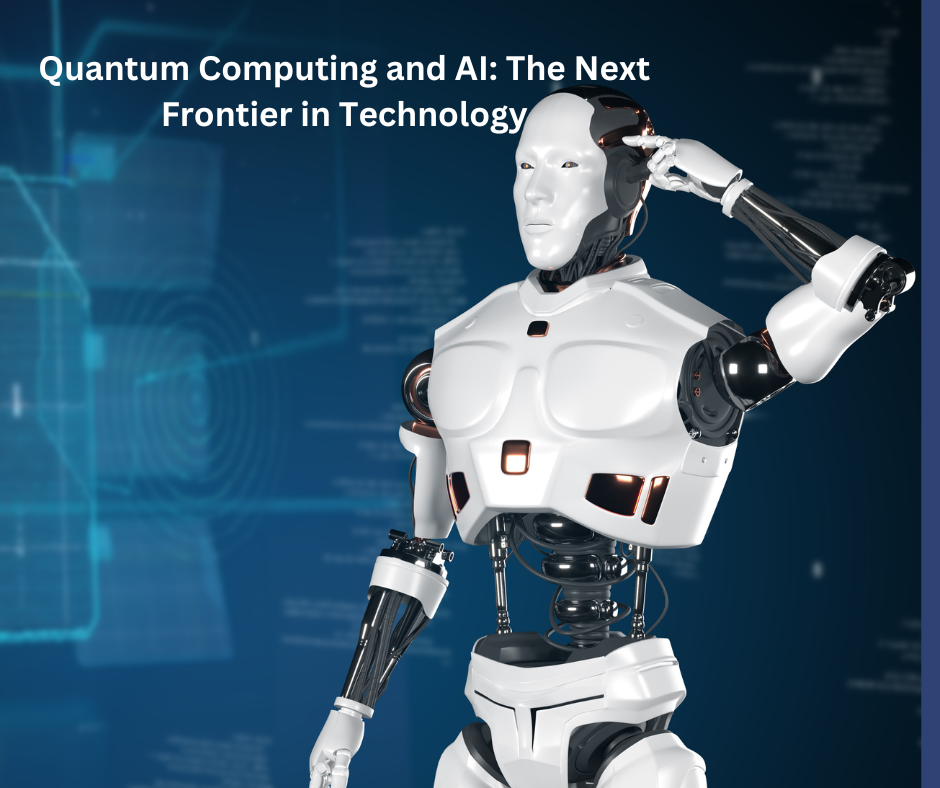Quantum Computing and AI: The Next Frontier in Technology
 Ruhi Parveen
Ruhi Parveen
In recent years, the convergence of two groundbreaking technologies—Quantum Computing and Artificial Intelligence (AI)—has sparked immense interest among researchers, tech enthusiasts, and industries alike. These technologies, individually revolutionary, have the potential to transform the world as we know it. When combined, they represent the next frontier in technology, promising to solve some of the most complex problems and unlock unprecedented opportunities across various fields.
What is Quantum Computing?
Quantum computing uses the principles of quantum mechanics to process information in ways that traditional computers can't.Unlike classical computers, which use bits as the smallest unit of data (representing either 0 or 1), quantum computers use quantum bits, or qubits. Qubits can represent both 0 and 1 simultaneously, thanks to a quantum property known as superposition. This allows quantum computers to perform multiple calculations at once, exponentially increasing their processing power.
Another critical concept in quantum computing is entanglement, where qubits become interconnected in such a way that the state of one qubit instantly influences the state of another, no matter the distance between them. This enables quantum computers to process complex information more efficiently than classical computers.
What is Artificial Intelligence?
Artificial Intelligence (AI) is when machines, especially computers, are designed to mimic human intelligence. AI encompasses a broad range of technologies and methods, including machine learning, neural networks, natural language processing, and robotics. These technologies enable machines to perform tasks that typically require human intelligence, such as understanding language, recognizing patterns, solving problems, and making decisions.
AI has already begun to transform various industries, from healthcare to finance, by automating tasks, optimising processes, and providing valuable insights from vast amounts of data. However, as AI systems become more advanced, they also require more computational power to train and operate effectively—this is where quantum computing comes into play.
The Synergy Between Quantum Computing and AI
The synergy between quantum computing and AI could potentially revolutionize the way we approach complex problems. Here’s how these two technologies could complement each other:
1. Accelerating Machine Learning Algorithms
One of the most exciting uses of quantum computing in AI is speeding up machine learning algorithms. Classical computers, even with advanced GPUs, struggle to process the massive datasets required for training sophisticated AI models. Quantum computers, with their ability to perform parallel computations, could significantly reduce the time needed to train these models, leading to faster and more efficient AI systems.
2. Solving Optimization Problems
Many AI applications involve solving optimization problems, where the goal is to find the best solution among many possible options. Quantum computing excels at optimization due to its inherent ability to explore multiple solutions simultaneously. For example, quantum algorithms like the Quantum Approximate Optimization Algorithm (QAOA) are designed specifically to tackle optimization problems more efficiently than classical algorithms, potentially leading to breakthroughs in fields such as logistics, finance, and drug discovery.
3. Enhancing Data Security with Quantum Cryptography
As AI systems become more integrated into our daily lives, the need for robust data security becomes paramount. Quantum computing offers solutions in the form of quantum cryptography, which uses the principles of quantum mechanics to create unbreakable encryption methods. These techniques could protect sensitive data used by AI systems, ensuring privacy and security in an increasingly connected world.
4. Advancing Natural Language Processing
Natural Language Processing (NLP) is a part of AI that deals with how computers understand and interact with human language. Quantum computing could enhance NLP algorithms by improving the processing of complex linguistic patterns and large datasets. This could lead to more accurate and sophisticated AI systems capable of understanding and generating human language with greater nuance.
Real-World Applications and Potential Impact
The combination of quantum computing and AI holds immense potential for various real-world applications. Here are a few examples:
1. Drug Discovery and Healthcare
Quantum computing could revolutionize drug discovery by simulating molecular interactions at an unprecedented scale and speed. Combined with AI's ability to analyze vast amounts of biological data, this could lead to the rapid development of new drugs and personalized medicine, potentially saving millions of lives.
2. Climate Modeling and Sustainability
Climate change is one of the most pressing challenges of our time. Quantum computing, paired with AI, could enhance climate modeling by processing complex environmental data more efficiently. This could lead to more accurate predictions and the development of strategies to mitigate the effects of climate change, helping to ensure a sustainable future.
3. Financial Modeling and Risk Management
The financial industry relies heavily on predictive models and risk management strategies. Quantum computing could enhance these models by providing more accurate simulations and optimizations. When combined with AI, this could lead to better investment strategies, more effective risk management, and ultimately, more stable financial markets.
4. Supply Chain Optimization
Quantum computing and AI could revolutionize supply chain management by optimizing logistics, reducing costs, and improving efficiency. Quantum algorithms could quickly analyze and optimize routes, inventory levels, and demand forecasts, leading to more resilient and responsive supply chains.
Challenges and Considerations
Despite the tremendous potential of quantum computing and AI, there are significant challenges that must be addressed before these technologies can be fully realized.
1. Technical Challenges
Quantum computing is still very new, and creating stable, error-free quantum computers is a major technical challenge. Current quantum computers are prone to errors due to decoherence, where qubits lose their quantum state. Researchers are working on developing error correction methods and more stable qubits, but it may take years before quantum computers become widely available.
2. Ethical Considerations
As AI gets more advanced, it's increasingly important to think about the ethical issues involved.The combination of quantum computing and AI could amplify these concerns, particularly regarding privacy, data security, and the potential for AI systems to make decisions that impact human lives. Developing frameworks for the ethical use of these technologies will be crucial as they become more integrated into society.
3. Access and Equity
The development of quantum computing and AI is currently concentrated in a few tech giants and research institutions. Ensuring that the benefits of these technologies are accessible to all, and not just a privileged few, will be a critical challenge. Governments and organizations must work together to promote equitable access to quantum and AI technologies, ensuring that they are used for the greater good.
The Future of Quantum Computing and AI
The future of quantum computing and AI is incredibly exciting, with the potential to transform industries, solve global challenges, and improve our daily lives. As these technologies continue to develop, we can expect to see breakthroughs that were once thought impossible.
Although there are many challenges ahead, the potential benefits are huge.By harnessing the power of quantum computing and AI, we can unlock new frontiers in technology, leading to a future that is more intelligent, efficient, and secure.
Conclusion
Quantum computing and AI represent the next frontier in technology, offering unprecedented opportunities to solve complex problems and drive innovation across various fields. For those looking to stay ahead in this rapidly evolving landscape, pursuing the Best Artificial Intelligence Course in Delhi, Noida, Mumbai, Indore, and other parts of India could be a pivotal step. As these technologies continue to evolve, their combined potential will likely lead to transformative advancements that could shape the future of our world.
However, realizing this potential will require overcoming significant technical, ethical, and societal challenges. By addressing these challenges and ensuring equitable access to these technologies, we can harness their power to create a better, more sustainable future for all.
Subscribe to my newsletter
Read articles from Ruhi Parveen directly inside your inbox. Subscribe to the newsletter, and don't miss out.
Written by

Ruhi Parveen
Ruhi Parveen
I am a Digital Marketer and Content Marketing Specialist, I enjoy technical and non-technical writing. I enjoy learning something new.